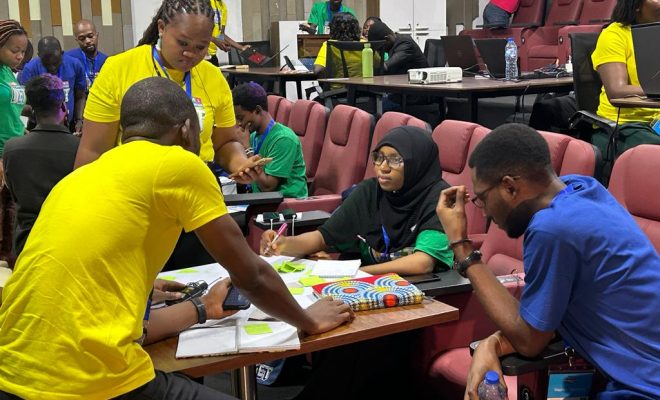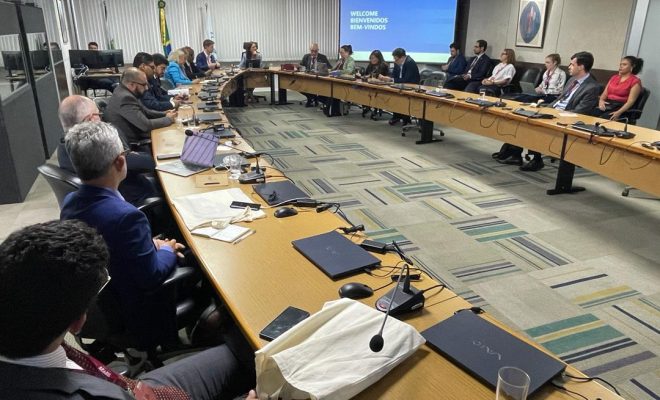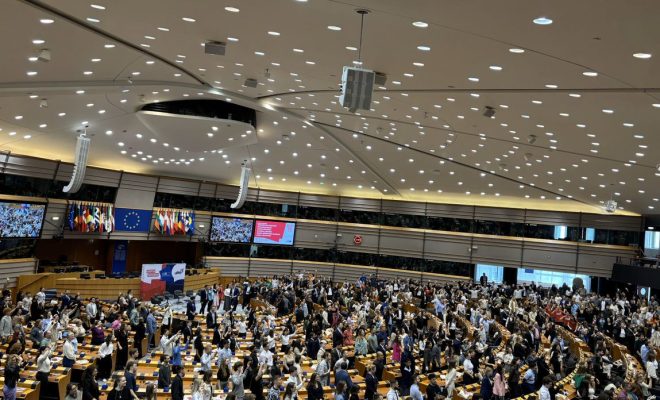50 young changemakers from Nigeria take part in the “Innovation to Transform Education Training”

On November 20th, 2023, UNESCO IESALC arrived at Lagos, Nigeria, to inaugurate the Innovation to Transform Education Training (ITET), alongside local implementation partner Future Perspectives, who welcomed trainees and partners with remarks by co-founders Yemi and Abby Asekun. On their opening remarks, Director of UNESCO IESALC, Francesc Pedró, and Lead of Transforming Education and Head of Partnerships and UN Liaison, Lily Liu, addressed the importance of ITET for supporting the role as youth as changemakers, by equipping them with project, policy, and innovation skills.
Meredith Preston McGhie, Secretary General of the Global Center for Pluralism (GCP), made inspiring remarks about the foundational role of pluralism as a positive and action-oriented response to diversity. It opened the way to the first skillset in the afternoon, on Pluralism Assessment, led byNathalie Sirois, also from GCP. A very dynamic session involved the 50 ITET young innovators in passionate discussions, case-studies’ analysis and group activities to put pluralism into practice.
ITET Nigeria will continue until Friday, covering six skillsets designed to equip participants with policy, project implementation and innovation skills to transform education, as part of the United Nations Global Youth Initiative (GYI), co-created by youth and student networks and several UN Agencies.
At the heart of the GYI lies the profound understanding that each young education stakeholder has the capacity to be a catalyst for change, shaping the future of education at all levels and UNESCO IESALC is entrusted with leading one of its capacity-building components.
The UNESCO International Institute for Higher Education in Latin America and the Caribbean (IESALC) plays a pivotal role in GYI, as lead of the capacity-building component which aims to equip youth with applied policy skills, project cycle and management skills and innovation skills for education, necessary to drive educational changes at different levels, informed by evidence and contextually sensitive approaches.
For this first edition, 50 young innovators are attending the program, coming from all Nigerian geo-zones. They were selected among more than 2800 applications, through a two-phase selection process that ensured diversity of social backgrounds, multiple educational-level focus and gender parity.
Putting local expertise, context-relevance and evidence-based approaches to meaningful educational change; ITET Nigeria was made possible through a partnership between UNESCO IESALC and local implementation partner Future Perspectives. It is also a result of collaboration with Queen’s University, the Global Center for Pluralism and 1 Million Teachers, who have joined as content partners, contributing to the connections between local and global priorities for providing youth with the knowledge and skills necessary to lead transforming education.
On November 21, ITET Nigeria young innovators enjoyed a training session on Risk-Management Project Management, instructed by Ike Oyewole, from 1 Million Teachers and co-designed by Queen’s University DDQIC. One important takeaway from students was the utility of project gates to support collaborative and iterative planning and implementation of their EdTech innovations.
In the afternoon, AltSchool Africa’s team conducted a comprehensive training on useful digital skills for innovators in the education sector, like storytelling, data ethics, LMS and Agile methodologies. Students’ feedback highlighted a keen interest for communications skills at all levels, from interpersonal interactions on their project’s values and impact all the way to public speaking for larger audiences and producing compelling media content.
The third day of Innovation to Transform EducationITET Nigeria, hosted the skillset designed by UNESCO IESALC on evidence-based skills for projects and policy making. Mid-way through the course, this three-hour session focused on key features of the educational policy ecosystem, connecting different levels of responsibility and accountability, and providing trainees with useful and ethically driven methodologies, methods, and instruments to inform evidence-based decisions at all phases of the policy cycle.
As lead of the capacity building component of the Global Youth Initiative aimed at equipping youth with applied project and policy skills to transform education, UNESCO IESALC had the responsibility of promoting a dynamic and interactive session in which the trainees could actively train their evidence-based skills in collaborative activities, such as guided reviews of policy research and a simulation on the role of policy advisors in real-life scenarios. Feedback from students have been positive, with some students asking for further guidance on negotiation and public speaking skills.
ITET Nigeria concluded its training sessions on Thursday, November 23 with the last two out of six skillsets. The morning was dedicated to Design Thinking as a problem-solving methodology for innovative education, co-designed by 1 Million Teachers and instructed by Lorraine Otoide. The trainees were conducted through a sprint version of all phases of design thinking – empathize, define, ideate, prototype, and test – to come out with a solution for an educational challenge.
In the afternoon, Lanre Oniyitan, also from 1 Million Teachers, was the host for skillset 6 on social and intercultural skills. With a focus on intercultural communication and collaboration with stakeholders across different sociocultural backgrounds, the session was a good opportunity fort trainees to share, discuss and delve into Nigerian cultural, ethnic and linguistic diversity and reinforce a sense of belonging and commitment to their common goals as changemakers.
On November 24th, after going through ITET six skillsets, all 50 youth innovators participating in the program presented their projects and initiatives in a three-minute presentation, followed by questions and feedback from the jury. The interdisciplinarity and diverse professional backgrounds of the jury members supported a holistic view on the impact, innovation, and feasibility of the initiatives, aimed at ensuring the right to education and transforming teaching and learning practices through EdTech in Nigeria.
To coronate the successful conclusion of the program, Future Perspectives, UNESCO IESALC -content partners-, and the youth innovators gathered at a celebration dinner and closing ceremony. At the occasion, distinguished authorities were also present, for instance, Professor Yemi Osinbajo, former Vice President of Nigeria, and Ms. C.J. Scott, Deputy High Commissioner of Canada in Nigeria.
The ten finalists from the pitch session will be part of a mentorship program over the next six months to support the implementation of their EdTech initiatives and all 50 participants are now integrated into UNESCO IESALC’s BIBO Network, which fosters the role of youth as changemakers in the education sector, through their projects and their direct participation in decision-making processes at all levels.
RELATED ITEMS







